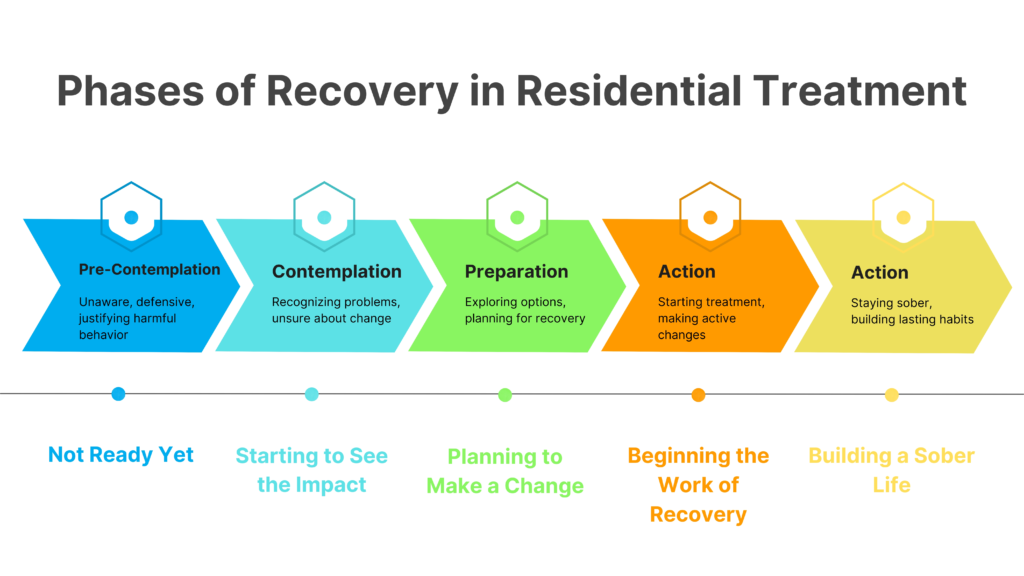Alcohol use disorder can quietly unravel your life, piece by piece. Maybe it started as a few drinks after work or on weekends, but over time, heavy drinking has taken more than you expected—your health, your relationships, your peace of mind.
The effects of alcoholism can ripple into every corner of your life. And when you finally consider help? It often feels overwhelming, intimidating, or even shameful.
You might ask yourself, Do I really need residential alcohol treatment? If outpatient care or cutting back on your own hasn’t worked, alcohol residential treatment programs might be the turning point you need.
These specialized treatment centers provide a safe, structured environment where you step away from daily triggers and focus on recovery.
What Is Residential Treatment for Alcohol Addiction?
Residential alcohol addiction treatment means living full-time at a treatment facility where you get round-the-clock care, therapy, and medical supervision. Unlike outpatient programs where you visit for therapy but live at home, residential alcohol treatment centers provide a controlled setting where everything—from your detox process to your daily schedule—is managed by experts.
Alcohol detoxification is often the first step. Withdrawal symptoms can range from mild symptoms like anxiety and sweating to life-threatening complications such as delirium tremens, a severe condition marked by seizures and dangerously high blood pressure. Medical staff monitor you 24 hours a day to keep you safe.
Treatment programs in residential settings include evidence-based therapies like cognitive-behavioral therapy (CBT) and dialectical behavior therapy (DBT), both designed to reduce alcohol cravings and help manage co-occurring mental health issues like anxiety or depression.
Besides therapy, these programs offer peer support and community—a crucial part of healing. Family members often see a remarkable change when their loved ones participate in residential treatment, as it provides tools for lasting sobriety and healthier relationships.
Why 24/7 Support Makes a Difference in Recovery
Continuous, 24-hour support during residential treatment is a key reason these programs are more effective for many people.
According to a 2019 study published in Drug and Alcohol Dependence, patients in residential treatment for alcohol had better long-term sobriety compared to those in outpatient care. Being removed from alcohol triggers at home and having immediate access to medical care makes a huge difference, especially during the detox process.
Withdrawal from alcohol can be unpredictable and, in some cases, life-threatening. Symptoms like elevated blood pressure, severe anxiety, and delirium tremens require constant monitoring. Treatment facilities with medical staff on site can intervene quickly to reduce risks.
Rock View Recovery, for example, offers alcohol detox alongside trauma-informed care and individualized treatment plans to address substance use disorders and co-occurring mental health conditions. This holistic approach helps tackle not just the addiction but the underlying causes and effects of alcoholism.
What a Day in Residential Alcohol Treatment Looks Like
Wondering what daily life looks like inside alcohol residential treatment programs? Here’s a snapshot:
Your morning might start with a health check—monitoring vital signs like blood pressure—and setting personal goals for the day.
Therapy sessions follow, including group therapy and individual counseling. Group work fosters connection and accountability, while one-on-one time with a counselor helps tailor your treatment plan to your unique needs.
You’ll engage in evidence-based therapies like CBT and DBT to learn new skills that reduce alcohol cravings and improve emotional regulation.
Wellness activities—yoga, meditation, art, or light exercise—support your physical and mental health. These aren’t just “extras,” but essential parts of healing from the effects of alcoholism.
Evenings often involve peer support groups or educational workshops focused on relapse prevention, coping strategies, and healthy lifestyle choices.
And throughout the day and night, medical professionals are on hand 24 hours, so you’re never left to face withdrawal symptoms or cravings alone. If you want to dive deeper into what treatment looks like, check out Rock View Recovery’s alcohol residential treatment program.
Is Residential Alcohol Addiction Treatment Right for Me?
You’re not alone if you’re wondering whether residential alcohol treatment is the right step. Here are some signs that it might be time to consider this level of care:
- Repeated relapses after outpatient or less intensive treatment
- A home environment that lacks support or has triggers for drinking
- Co-occurring mental health issues such as depression, anxiety, or trauma
- Medical risks during alcohol detoxification that require supervised care (like unstable blood pressure or delirium tremens)
- Motivation to stop drinking but needing structured, consistent support to do so
Residential treatment programs provide a structured environment designed to reduce alcohol use safely while addressing both addiction and mental health. If any of these apply to you or a loved one, seeking help at a residential treatment center can be life-changing.
What is residential treatment for alcohol addiction?
Residential treatment is a live-in program offering 24/7 medical supervision, therapy, and peer support. It provides a safe environment where people can focus fully on stopping drinking and healing, away from daily triggers and distractions.
How long does alcohol rehab usually last?
Most residential alcohol treatment programs range from 30 to 90 days. The exact length depends on your individual needs, progress, and the treatment plan designed to help you safely detox and build lasting recovery skills.
What’s the difference between residential and outpatient rehab?
Residential treatment means living full-time at a facility with constant care, while outpatient rehab lets you live at home and attend therapy sessions regularly. Residential offers more structure, support, and supervision, especially during early recovery and detox.
Does insurance cover residential treatment?
Many insurance plans offer partial or full coverage for residential alcohol treatment. Coverage varies widely, so it’s important to check with your insurance provider and the treatment center to understand your benefits and any out-of-pocket costs.

Quick Tip: You Don’t Need to Have It All Figured Out
Feeling scared or uncertain about residential alcohol treatment is completely normal. You don’t have to have all the answers or a perfect plan to get started. Sometimes, just making one call or asking one question is the first step in a journey toward healing. Healing starts with curiosity, not certainty.
Start Your Recovery at Rock View Recovery
Alcohol addiction doesn’t define who you are, nor does it have to dictate your future. Change begins in a safe, supportive space where your physical health and emotional well-being are prioritized.
Rock View Recovery offers residential alcohol treatment in Arizona that combines medical detox, trauma-informed care, and individualized treatment plans. This isn’t just about stopping drinking—it’s about healing your whole self, body and mind.
Feeling scared or uncertain is completely normal. But you don’t need to have it all figured out right now. Sometimes, the hardest part is taking the first step: calling to ask a question, or learning more about your options.
Recovery is possible. It starts with one decision—to reach out for help and accept support. When you’re ready, Rock View Recovery will be there to walk beside you every step of the way.
Key Takeaways
- Residential alcohol treatment offers immersive, 24-hour support critical for many people’s recovery journey.
- It’s ideal when outpatient care hasn’t worked or when withdrawal symptoms could be life-threatening.
- Treatment programs blend medical care, therapy, peer support, and wellness activities to address the effects of alcoholism fully.
- You don’t have to wait until “rock bottom” to get help—early treatment improves outcomes.
- Recovery begins with one brave step to reach out and accept support.
